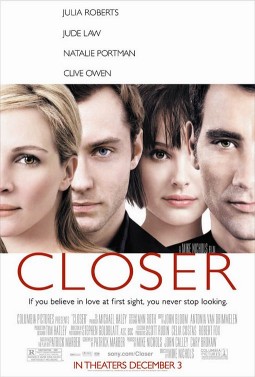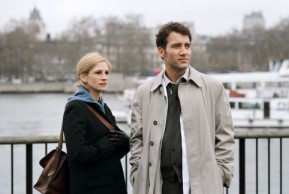|
Closer
Mike
Nichols’ adaptation of Patrick Marber’s play
is definitely worth looking into. Unfortunately, it may
get overlooked.
Look
no further than the cast to see the potential in this tangled
tale of a love quadrangle between four very humanly flawed
characters. Not having seen the play to gauge a comparison
of the film to, Marber’s characters at the very least
feel like they’ve been thoroughly fleshed out.
Here
is a film that is sure to make some waves based on performances
alone. Anna (Julia Roberts), a divorcee photographer living
in London, falls hopelessly for the troublesome Daniel (Jude
Law), a former journalist turned novelist who is bound romantically
to his muse Alice (Natalie Portman), an ex-stripper turned
waitress.
How
does Dr. Larry (Clive Owen) fit in? Daniel inadvertently
introduces him to Anna after a witty yet deceitful game
of cyber-sex that is not only fresh and original, but also
more realistic than most chat room sequences in other films.
That
seems to be the heart and soul of Closer to begin
with: realistic, original, and strikingly captivating. No
two characters are completely innocent, and no character
is innately pegged with the badge of evil.
We find
ourselves rooting for each one in specific circumstances
and pitying them in others. To say that scenes this raw
have never graced the silver screen would be naive, but
to ignore their courageousness would be a mistake.
Roberts,
especially, extends herself against the typecast that usually
accompanies her name. Her Anna is capable of shameful wrong
and falls into the trappings we all find ourselves falling
into at times. She is weak. She is a coward. The same could
be said for the others as well. They are each victims of
their own loneliness and cowardice.
Larry’s
isolation leads him to troll for sex on the Internet, ultimately
resulting in his involvement with Anna. Alice, although
remarkably independent in many regards, also proves to be
running from something in her life, although exactly what
that may be is not entirely known.
Dan’s
reluctance to accept what he wants for fear of losing what
he has proves critical. He declares the desire for truth
from Alice, yet he refused to be truthful with her about
his feelings for Anna. Anna feared the consequences of the
truth with Larry, yet was brutally honest with Dan. Dan
declares that “lies are the great currency of the
world” when asking why Anna didn’t simply lie
to protect him from her dalliances.
In retrospect,
Larry’s pride drives Anna away, but his regret feels
genuine even if he is a prick at times. Alice wants to love
unconditionally, but her lack of trust stems from some dark
secret in her past. She holds all the cards in the game
of lies, as Dan learns ultimately in the end.
Much
has been made of the question of nudity in relation to Portman’s
depiction of Alice, a character who leaves a life of stripping
behind her when she moves to London from New York only to
find herself returning to this practice in a time of weakness.
The
gossip columns had a field day with Nichols’ decision
to excise sequences of full-frontal nudity at Ms. Portman’s
request. Despite the hullabaloo, Closer manages
to survive without these scenes.
In fact,
Portman manages to pull off yet another brilliant performance
in the wake of her stints as Princess Amidala in George
Lucas’ “galaxy far, far away,” first in
Garden State and now here as Alice.
Every
aspect of this film is tangible and genuine, yet some may
find it difficult to relate to some of these characters
because of their flaws. The problem is, these flaws are
what make them each indelibly human and ultimately drives
this film forward.
This
isn’t your run of the mill perfunctory romance, a
tale of lovers who overcome the odds created for them specifically
to overcome. Instead, there is no clear-cut couple that
stands out in the film because they are all guilty in some
ways. We
believe the love between these characters, and as they get
pulled further and further into the tangled web of lies,
deceit, loss, and love, we can’t help but identify
with the places they find themselves at times.
When
Dan and Anna decide to break it off with Alice and Larry
respectively, owning up to their year-long affair, we peek
into situations everyone finds themselves in at times in
our lives, playing the roles of the heartbreaker and the
heartbroken. We see evidence for and against each couple
when they are together, and when one pair emerges “triumphant”
in the end it doesn’t necessarily come across in a
welcomed fashion but we accept it.
We understand
the motivations, and we aren’t asked to agree, but
we are forced to consent to the result much like we must
understand and respect the choices of friends and loved
ones in our lives.
Although
Closer may not be regarded as Nichols’ strongest
work, he still deserves kudos for adapting this stage play
to the screen in such a way that the essence is retained
throughout. At times one can picture these scenes unfolding
on a stage, yet without feeling overtly staged.
Rating:

|








